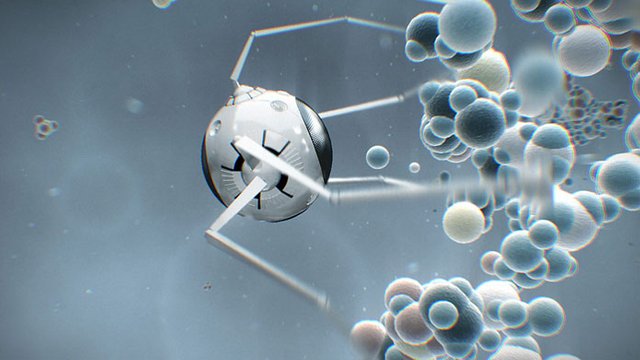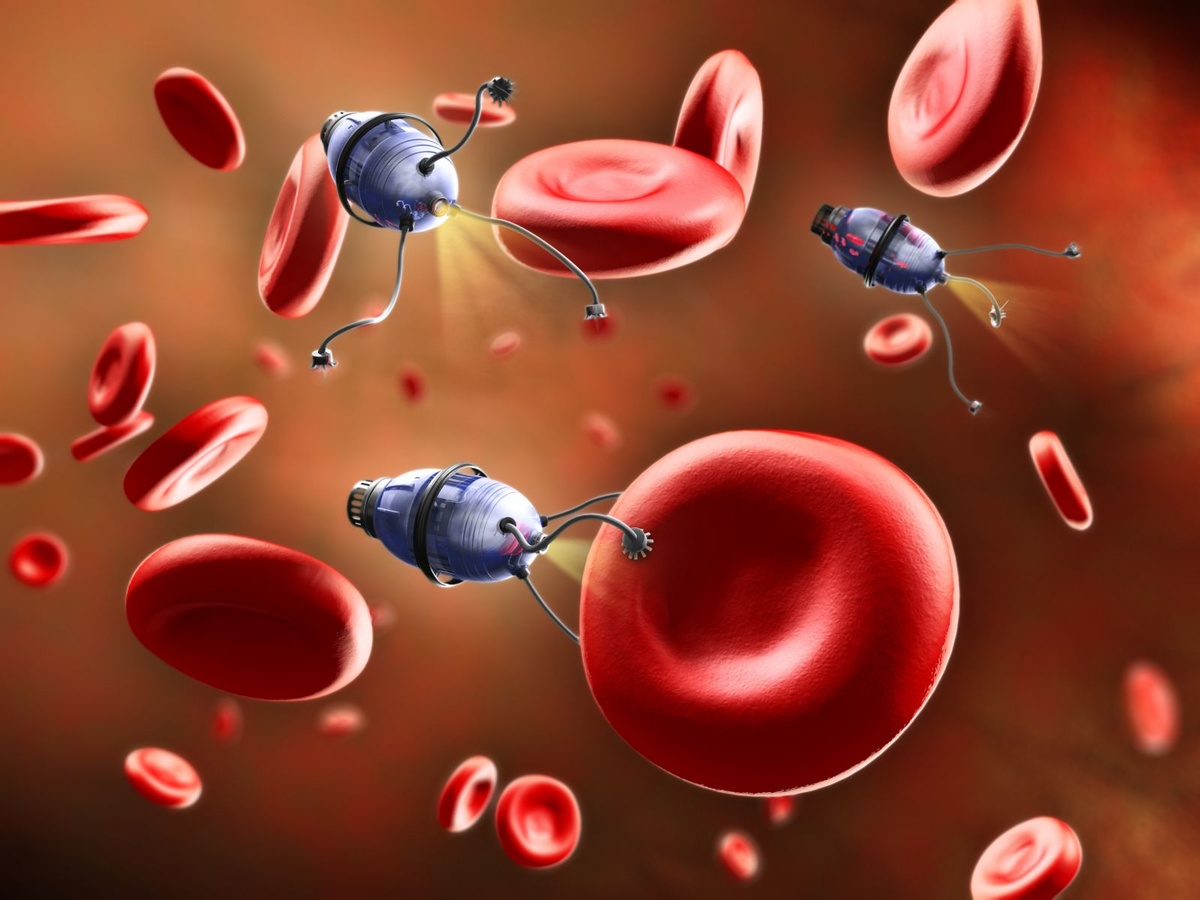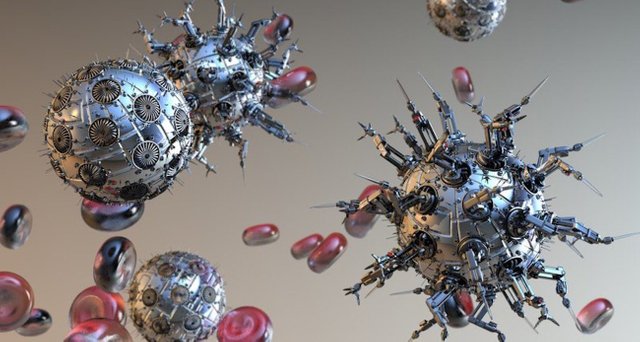Nanorobots: future in the present

Nanorobots – man-made creation the size of a molecule that are designed to perform the most important tasks in various spheres of life, from science to medicine, from military technology to space exploration. Previously, nanotechnology existed only in fiction and film, but in recent years, the leading scientific centers of all developed countries of the world give this topic of paramount importance. Development of full-fledged technology of nanorobots will radically change the world science and will bring us closer to the enchanting future that science fiction has been waiting for.

Central to nanotechnology is the long-standing desire of mankind to adapt to the work even the smallest particles of matter – atoms. The desire to subjugate nature to the last drop in the end led to the manipulation of individual atoms that chemists produce for twenty years. Many modern materials, which previously did not exist in nature, were created from atoms of different elements in chemical laboratories. The size of one atom is no more than a tenth of a nanometer, hence the name "nanotechnology"
History of nanotechnology
The first step towards the creation of nanorobots was the invention of the electron microscope, capable of moving in the electromagnetic fields of the individual atoms. We tested the revolutionary technology in the eighties of the last century, collecting a pair of rotating gears of nanometer size from carbon atoms. Seeing that the beginnings of nanotechnology are quite viable, scientists in a few years were able to create the first nanodrop operating on electric traction. In the future, they hope to convert the microscopic motor into a manipulator, which itself will rearrange the atoms, making it easier to work in laboratories. Thus, nanorobots will be able to give humanity great prospects for changing the internal molecular structure of any matter – and, in fact, the power over nature.
"Nanotechnology gives us the ability to create unique materials without unnecessary impurities that can be freely used in any production – for example, the ideal superhard diamonds from carbon atoms. With the widespread use of nanorobots, it will no longer be necessary to build huge factories: an army of small workers will gather any product from atoms."
Nanorobots in medicine
The most useful area for the use of nanorobots today is medicine. Doctors plan to use this technology for emergency delivery of drugs and nutrients directly into cells, as well as to destroy infections and cancer cells. nanorobots can penetrate into the body tissues and destroy any disease instantly, even without the use of special drugs. This will help to combat genetic disorders, because at the level of molecules and atoms can correct any mistakes of nature.
Other medical nanorobots are designed for accurate diagnosis of diseases, the collection of data on the human body. With the beginning of active use of this technology, medicine will develop at an accelerated pace, because this is a chance to look inside the working cells, to study healthy and tumor-damaged tissues, in the end, to get to the previously inaccessible secrets of our body.

Now in nanomedicine priorities are the following areas:
Delivery of medicines directly to the body or system in need at the cellular level.
Strengthening immunity or its weakening to combat allergic reactions.
Surgery microscopic cuts that allow to speed up the healing period post-surgery stitches.
Diagnosis and treatment of cancer.
Safe distribution of vaccine components in the body.
These methods are already tested on laboratory animals, are now preparing tests on people who will forever change the world medicine, if they are successful. Take, for example, nanorobots that deliver medicines to cells. Thanks to them, not only the consumption of the drug will decrease many times, but also the number of side effects from potent drugs, because they will not affect other organs and systems, except those directly affected by the disease. The medicine will be delivered directly to the cell through its cytoplasm. Vaccination will also be simplified, moreover, unpredictable antibodies can be replaced immediately with nanorobots that will fight any infections that enter the body from the outside.
To date, the use of nanotechnology in medicine has already been recorded – first of all, to fight cancer. Nanoparticles called liposomes deliver chemotherapeutic agents into cancer tumors. First of all, this method is used to treat HIV Kaposi sarcoma, myeloma and ovarian cancer.

Nanorobots in the third world war
Humanity would not be itself if it did not find a way to apply any high technology in military Affairs. Nanorobots are not yet used as weapons, but developments in this area are almost as active as in the field of medicine. Many futurologists predict that in the future wars will be fought in General without the participation of living soldiers, and, for example, between the armies of nanorobots. So, the American scientist of the Russian origin Alex Kushleyev already tests some groups of the flying nanorobots capable to coordinate actions with each other and to create difficult designs in air. More than a hundred of these small drones can be really formidable weapons, if they provide sufficient firepower.
According to Edward teller, inventor of the hydrogen bomb, nanotechnology will be a decisive factor in the third world war, if it happens. The one who first subjugates combat nanobots will be able to conquer the world. Moreover, nanotechnology could lead to this war if world leaders tried to steal each other's cutting-edge designs. Since nanorobots are capable of self-restoration and construction of their own kind from the simplest atoms, this war can really become endless and extremely destructive. Even if the battles are still fought with human involvement, nanobots are used to deliver biological weapons and poisons directly into the body of enemy soldiers.
Nanorobots are one of the cornerstones of modern science fiction cinema and literature
The creators of films and serials see the future use of nanites in plastic surgery (one of the heroes of the fantastic detective "Almost man" stole the features of other people's faces with the help of nanorobots and changed his DNA to become more attractive), or even make them a separate race, negative attitude towards people (as in the TV series "Stargate" and the film "the Day when the Earth stopped"). Anyway, the development of nanotechnology will change our lives forever. It is up to us to determine how destructive these changes will be.
Try Our Service Before Buy🎁
we have paid service too so please check them too. Active the free upvote service and learn more about it here : JOIN NOW CLICK HERE